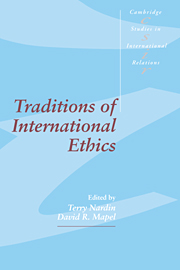Book contents
- Frontmatter
- Contents
- Contributors
- Preface
- 1 ETHICAL TRADITIONS IN INTERNATIONAL AFFAIRS
- 2 THE TRADITION OF INTERNATIONAL LAW
- 3 THE DECLARATORY TRADITION IN MODERN INTERNATIONAL LAW
- 4 CLASSICAL REALISM
- 5 TWENTIETH-CENTURY REALISM
- 6 NATURAL LAW AND INTERNATIONAL ETHICS
- 7 KANT'S GLOBAL RATIONALISM
- 8 UTILITARIANISM AND INTERNATIONAL ETHICS
- 9 THE CONTRACTARIAN TRADITION AND INTERNATIONAL ETHICS
- 10 LIBERALISM AND INTERNATIONAL REFORM
- 11 MARXISM AND INTERNATIONAL ETHICS
- 12 THE IDEA OF RIGHTS IN INTERNATIONAL ETHICS
- 13 BIBLICAL ARGUMENT IN INTERNATIONAL ETHICS
- 14 CONVERGENCE AND DIVERGENCE IN INTERNATIONAL ETHICS
- Index
- Titles in the series
4 - CLASSICAL REALISM
Published online by Cambridge University Press: 15 September 2009
- Frontmatter
- Contents
- Contributors
- Preface
- 1 ETHICAL TRADITIONS IN INTERNATIONAL AFFAIRS
- 2 THE TRADITION OF INTERNATIONAL LAW
- 3 THE DECLARATORY TRADITION IN MODERN INTERNATIONAL LAW
- 4 CLASSICAL REALISM
- 5 TWENTIETH-CENTURY REALISM
- 6 NATURAL LAW AND INTERNATIONAL ETHICS
- 7 KANT'S GLOBAL RATIONALISM
- 8 UTILITARIANISM AND INTERNATIONAL ETHICS
- 9 THE CONTRACTARIAN TRADITION AND INTERNATIONAL ETHICS
- 10 LIBERALISM AND INTERNATIONAL REFORM
- 11 MARXISM AND INTERNATIONAL ETHICS
- 12 THE IDEA OF RIGHTS IN INTERNATIONAL ETHICS
- 13 BIBLICAL ARGUMENT IN INTERNATIONAL ETHICS
- 14 CONVERGENCE AND DIVERGENCE IN INTERNATIONAL ETHICS
- Index
- Titles in the series
Summary
“Realism” is probably the second oldest perspective we have on the place of ethics in international politics. The oldest, of course, is the patriotic moralism that sees a simple struggle between right and wrong in international affairs, with one's own community infallibly in the right. Realism appears against this background as a skepticism concerning the relevance of moral categories to the relations among states. The realist tradition in Western thought dates to ancient Greece, particularly to the writing of the historian and political thinker Thucydides. The “classical realism” that is the subject of this chapter is a tradition that begins with Thucydides and extends through Machiavelli to the early social contract theorists Hobbes, Spinoza, and Rousseau. Though this tradition has been immensely powerful, it is to some extent an artificial construct – these thinkers did not by and large think of themselves as adherents to a tradition, but as innovators. Nevertheless, as we shall see, they share a fundamental perspective that puts them on the same side of the important questions of ethics and international politics.
The essence of international realism is its belief in the primacy of self-interest over moral principle, of necessity and therefore as of right, in international politics.
- Type
- Chapter
- Information
- Traditions of International Ethics , pp. 62 - 84Publisher: Cambridge University PressPrint publication year: 1992
- 13
- Cited by

